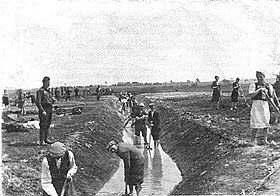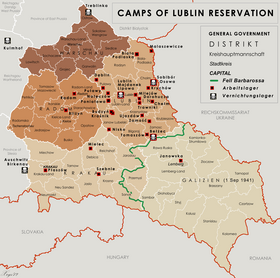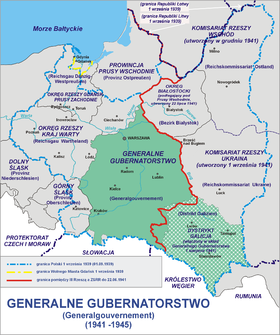Nisko Plan
| Lublin Reservation | |
|---|---|
| Nisko und Lublin Plan | |

Prisoners of Krychów forced labour camp build irrigation ditches across peat wetlands of modern-day Polesie National Park for the new German latifundia of Generalplan Ost, 1940
|
|

Camps of the Lublin Reservation, with Kreis of General Government from 1939 to 1941. Outline of the new Lublin Distrikt in upper centre (tan)
|
|

The territory of Generalgouvernement in 1939 (green) within the borders of prewar Poland; new German Distrikt Galizien (1941), bottom-right
|
The Lublin Reservation (German: Lublin-Reservat) was a concentration camp complex developed by Nazi German Schutzstaffel (SS) in the early stages of World War II, as the so-called "territorial solution to the Jewish Question". The idea for the expulsion and resettlement of the Jews of Europe, into the remote corner of the Generalgouvernement territory bordering the cities of Lublin and Nisko, was devised by Adolf Hitler and formulated by his SS henchmen as the so-called Nisko und Lublin Plan named alternatively after both locations. The plan was developed in September 1939 after the invasion of Poland and implemented between October 1939 and April 1940, in contrast to similar Nazi "Madagascar" and other Jewish relocation plans invented already before the attack on Poland at the onset of World War II.
Adolf Hitler devised the idea with the help of Nazi chief ideologist Alfred Rosenberg and Reichsführer-SS Heinrich Himmler, including active participation of SS-Obersturmbannführer Adolf Eichmann ("architect of the Holocaust"); as well as Heinrich Müller of the Gestapo, Hans Frank (Hitler's personal lawyer), and Arthur Seyss-Inquart of the Generalgouvernement administration. Gruppenführer Odilo Globocnik, the former Gauleiter of Vienna – appointed the SS and Police Leader of the new Lublin District – was put in charge of the reservation. During early implementation of the plan, the Nazis set up a system of ghettos for Jewish civilians to utilize them as the German workforce. The first forced labour camps were established for the Burggraben project intended to fortify the Nazi-Soviet demarcation line, and to supply the local SS units at Lublin from Lipowa.
...
Wikipedia
